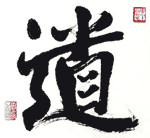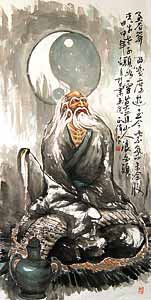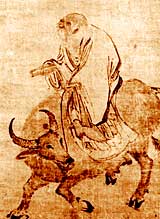|
|
||||
|
TAOISM "Softness conquers hardness" |
||||
|
Hardly any other martial art existing makes such consequent use of the taoistic philosophy as WingTsun. |
||||
|
But just what does "Taoism" mean? The idea of Tao is reflected in the beauty of Chinese script. Because the ink consists mainly of water, Chinese calligraphy demands that one "must go with the current". It can easily be seen if the writer lingered, was too hasty or tried to correct. The Chinese way of thinking and feeling finds it's roots in the principles of polarity, not to be confused with contrast and conflict. Yin and Yang, woman and man, plus and minus, in- and exhaling, black and white, they all express the same logic: one could not live without the other. The american China expert Alan Watts writes: "Yin and yang's philosophy is both serene and cynic". This conception is the fundamental principle of Taoism. "Nothing on this planet is softer than water - but water is incomparable when it comes to conquering hardness" Taoism is not a Chinese religion, it is an ancient philosiphy. No one knows who conceived Taoism , or exactly when the idea of Taoism was born; it is simply an element of Chinese wisdom. In the original form of Taoism, there are no rituals or exercises, but the principles can be found in the revised, more complicated forms of other Asian religions such as Zen-Buddism. A classical book about Taoism is the book from "Tao and Te" (also called "Dao and De" in modern transcriptions). "De" is often translated as "virtue". The "Tao Te King" is attributed to the wise teacher Lao Tse. It is not known when or by whom it was written. It was seen as a holy script, not the work of a single author. Until 1973, it's contents were only known from the transcripts of Wang Bi, a philosopher who brought the word-of mouth transcription to paper, including some of his own comments, in the year 3 A.D.. Recently, an even older script was found, the so-called the "Silk Scripts of Mawangdui".
"The Daodejing is an ancient Chinese book that will never be completly understood in these regions, no matter how often it may be translated". The Tao Te King was written as a textbook for statesmen and the monarch. Most of the wisdoms were meant as suggestions on the best way to rule a country. However, these wisdoms can also be used for one's personal development; it is very easy to interpret the Script in such a way. The theory of Taoism is not dedicated to it's usefullness, prehaps the reason why it is still relativly unknown, compared to Buddisim, which is finding more and more non-Asian followers. A Taoist does not try to convince others of his opinion, and he does not try to convert people to Taoism. Ideally, his compulsive function is that of a role model; one will notice his composure, his high-spiritedness as well as the peacefullness he radiates. If someone should be interested in the source of such vitality, the Taoist will not keep his knowledge of the Taoistic wisdom a secret, for he is not a friend of mystery-mongering.
"Acculturation of the body" Taoists acquire their perception through the contemplation of nature. They see human thoughts as a natural process: thoughts grow in the brain in the same way that grass grows in a meadow. The older form of Taoism teaches that the body must be "cultivated". A monarch who wishes to have the world in unison must, first of all, look after the needs of his body. Harmful developments should be recognized as such from the start. A illness can only be cured when treated in the beginning stages. In this way, the Taoist uses the smallest amount of energy and his way of proceeding is also the most effective. The practice of Taoism is also a form of physical exercise. By letting the "Chi-energy" flow (through breathing), unexpected sources of strength are set free. In this way, Chi-Gung and Siu Nim Tao are forms of meditation. "Create without owning; take action without dependence; allow growth, and do not command". This means: "Hidden strength" Translated into a modern version, Tao is the consistent conception of "wholeness": everything in this universe somehow belongs together, nothing stands apart. This idea is, of course, not found only in Chinese philosiphers, it also finds itself in new physics (Holismus), music, modern management - and - WingTsun.
"Life without tranquilizers" So just what is "Tao"? Theo Fischer writes: "Tao is a dimension of yourself and myself. It can not be accessed by thought, but it can very well be established and become a way of life for each and every one of us". It is true that you won't get far if you attempt to grasp the idea of Tao through intellect. Our form of intellect thrives on security, but security is a deceptive form of hope, a kind of permanent tranquilizer. And sometimes you just have to admit that you were building on sand. Everyone who has gone through a life crises knows this phenomenon: the turning point is reached just when you are exhausted and ready to resign. In this moment the "Tao" comes to life, a form of strength that lies beyond our control. In the Taoistic way of thinking, softness dominates over hardness, and depth over height. Because all rivers flow into deeper seas, it is more powerful to be soft, indefinite and restrained; this is seen as the highest ideal. This would lead to being propitious when misunderstood, one would try to master a situation by remaining favorable at all times. Exactly when a situation reaches the boiling point is something that each individual must - and should - determin for himself. To follow your personal "Tao" means that you must free yourself from apparent binding ties - and from the fear of being judged in a negativ way by others. A Taoist does not fight against his own weak points, he accepts them. He is successful because he doesn't force success. This "non-enforcement" means "Wu Wie" [-also called "Wu Wai"-] - and can be translated in many different ways. "Wu Wie" tells you not to take action, but at the same time , not to be undecided, foolish or lazy. Ideally, living in the sense of "Tao" requires no energy. No one has to learn anything for something they already have. With this effortlessness it is possible to release an amazing amout of energy.
"Chattering thoughts" "Wu Wie" requires that the "chattering inner voices" fall silent. Our mind is an extremly talkitive companion. We are forever thinking about what we have experinced, how to handel what, and what may come next. It is very difficult for us to see the world around us in a neutral and unconcerned way. A very practical Taoistic wisdom is: when you can't sleep because thousands of thoughts are buzzing around in your head, then try to see yourself and think: so here I am, musing and pondering about. Or, as Alan Watts puts it: "It's useless to compress the flood of thoughts that is almost always present in the head of an adult. If the thoughts will not stop, then let them flow; listen to them as if it were traffic noise or the cackling of chickens". This can only work when you do not constantly rush about in a hurried way. You must learn how to let yourself go, how to take time and be attentive. Otherwise you may not notice the moments to be cherished. Here is a little story: A bus full of tourists is driving through a breathtaking landscape. Everyone grabs their camaras and video camaras. Except one person. He stays seated and quietly lets the tremendous scenery pass by unfilmed. When asked by one of his companions why he wasen't taking pictures he answers: "No, I prefer to enjoy the landscape here and now".
Lao Tze travelled west on his water buffalo "Everyone on this planet knows that water can
defeat massive structures, that softness can defeat hardness -
but no one that would make use of this knowledge".
end of part 1
|
||||
|
|
||||


